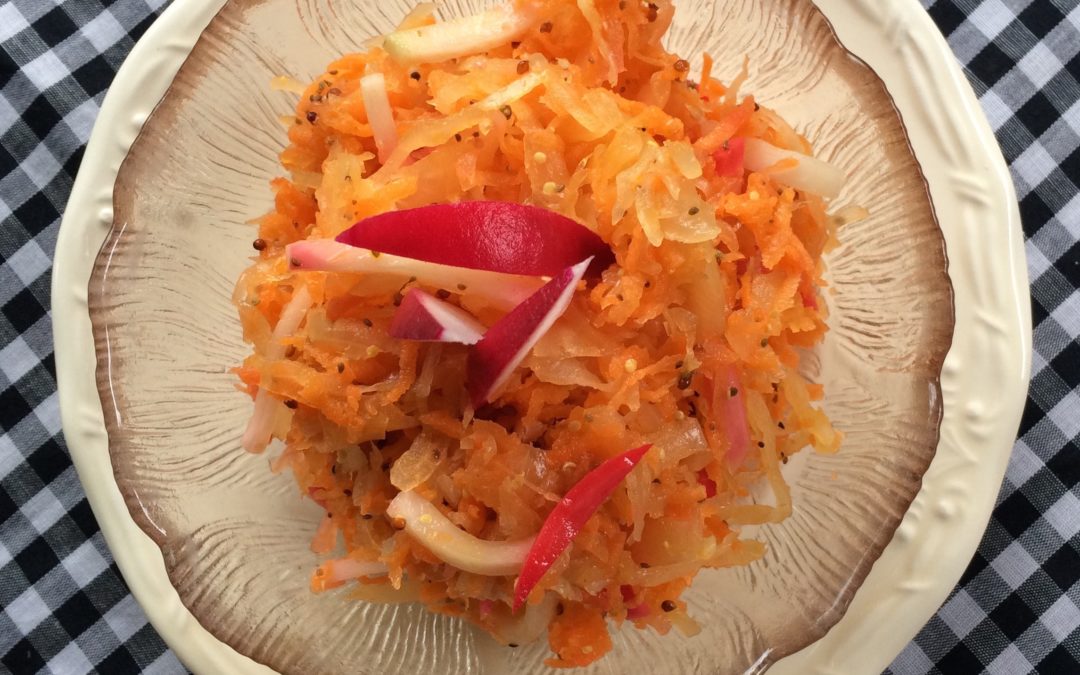If you read our recent post all about prebiotics, probiotics, and what the research is saying about their health benefits, you might be on board with getting more of these helpful bacteria into your gut!
Most fermented food products on the market make use of lactose as a food source to allow those helpful probiotics to grow and thrive in products like kefir and yogurt. Although IBS sufferers have the added challenge of avoiding most dairy products that contain lactose while following a low FODMAP diet, it’s still possible to eat your fermented foods and we’ve got just the recipe to get you started!
But remember, fermented foods affect each of us differently. You are unique and have unique counts and amounts of bacteria living in your gut. It’s always a good idea to work with a dietitian to help you improve your gut health and better manage symptoms.
Probiotics and the Fermentation Process
Did you know the science of fermentation is called zymology? There’s a brand new word for you to use during your next Scrabble game 😉 During the fermentation process, specific strains of bacteria are introduced to foods.
These “safe” bacteria consume carbohydrates to prevent the food from spoiling and they then produce a variety of products such as carbon dioxide or lactic acid. These safe probiotic bacteria help establish healthy microbial colonies in our gut to enhance our immune systems, help with healthy digestion, and possibly prevent a whole host of other conditions including IBS! Not all fermented foods have live bacteria in them and it can be hard to keep those beneficial bacteria alive because of how sensitive they are to differing environmental conditions.
For example, pasteurization, a common food preservation technique used for things like apple cider and honey, uses heat to kill harmful bacteria, but it also kills the good probiotic bacteria. Some bacteria thrive in low or no oxygen environments while others require oxygen to survive. You can probably see how hard it is to keep the good guys in and the bad guys out!
Sauerkraut for IBS
Not all sauerkrauts are created equal! For starters, when dealing with IBS, you want to make sure that the sauerkraut you’re using it made from common cabbage (smooth leaves), as savoy cabbage (the one with crinkled leaves) can cause IBS sufferers some discomfort if consumed in quantities greater than ½ cup according to the Low FODMAP diet.
Another thing to think about is whether or not the probiotics available in your sauerkraut are alive and able to have a positive impact once they make it into your gut. Although canned and jarred sauerkraut products may have been fermented and may have had live probiotics in them at one point, they are pasteurized to be shelf stable, which means that the probiotic bacteria have not survived.
Refrigerated sauerkrauts on the other hand tend to have more well preserved live probiotic cultures that will settle down in your gut and help you reap the benefits of improved gut microflora.
Looking for a commercially made sauerkraut product with probiotics may require you to visit your nearest health food store or farmers market, and look for a product that says it contains live cultures on the label.
Even if you don’t consider yourself a fan of sauerkraut, this recipe might just be the one to change your mind! This unique recipe is sure to entertain your taste buds, and is also full of low FODMAP ingredients making it a safe and tasty addition to any meal. This recipe is our low FODMAP take on a traditional coleslaw, but if you’re feeling creative, you can mix things up and test out any other low FODMAP salad dressing. A dressing with some sweetness will work best to keep your flavours in balance, since the sauerkraut has some serious tang to it!
Low FODMAP Recipe: Sauerkraut Coleslaw
Makes: 4-6 servings
Time: 10 minutes prep
INGREDIENTS
1 cup carrot, finely shredded
3 radishes, finely shredded
1 ½ cups sauerkraut (remember to buy the refrigerated kind and look for live active cultures on the label to get any benefit from probiotics)
2 tbsp olive oil
2 tbsp white sugar
2 tbsp rice wine vinegar
½ tbsp Old Style Whole Grain Dijon Mustard (or any other type of mustard you like)
1 tsp whole celery seeds
INSTRUCTIONS
Shred carrot and place into a serving dish.
Shred radishes and add to the serving dish.
Measure out sauerkraut and place into the serving dish along with the carrot and radish. You don’t need to strain the liquid from the sauerkraut, just spoon it out of the jar with whatever liquid comes along with it, it will mix in with the dressing!
Whisk together oil, sugar, vinegar, mustard, and celery seeds until combined in a small bowl.
Pour dressing over salad and toss. Like most coleslaw recipes, this one gets better if it’s allowed time to sit in the fridge for at least a few hours before serving to allow for all the flavours of the dressing to be absorbed by the veggies.
Remember: Some people with digestive issues and IBS may find fermented foods or highly acidic foods cause symptoms and discomfort. Perhaps add this food in just a small amount to start. Be mindful when adding this food into your diet, be aware of your body and track your symptoms.
Wishing you good gut health and wellness,
Stephanie and the Team

